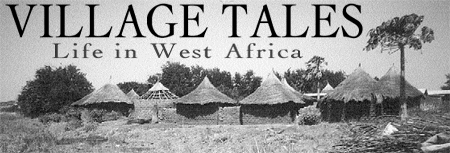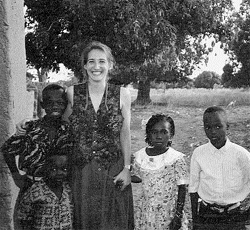WINTER 1998 Montanan - Volume 15, Number 2

by Rachel Schneller
"You and the sun," I say, greeting in traditional fashion a circle of elderly men drinking tea in the shade of a mango tree.
I am on the way to the pump in Zignasso, the village where I have served as a Peace Corps volunteer for the past year. Located in southern Mali in West Africa, Zignasso is about the size of Polson, Montana. In most of Mali, there is no running water or electricity, and my post is no exception. The old men spend the better part of the "sun" time of the day as watchdogs at the pump, making sure teenage girls do not wander off into the bush with any young men.

Schneller stands with children from Zignasso, the village in Mali where she serves in the Peace Corps. The elders acknowledge my greeting and address me by the name they have given me: "Did you have peace today, Salimata?" In the way Americans pursue money, Malians pursue peace.
"Only peace," I reply. After a year in a country where temperatures seldom dip below ninety degrees Fahrenheit, where there is no air conditioning, refrigeration or street lamps and where three people in my adopted village family have died in five months from malaria, I too have learned to hope that each day does not bring too many calamities.
"How is your family? How is your husband? How are your children?" they ask. The old men know I am single and childless, but they pretend otherwise because it would be impolite of them to imply that a woman my age might not have found a husband or borne children.
"There are no problems," I reply. This is not exactly true. The thatch roof of my hut leaks. My tomato plants were eaten by goats, and the papaya trees I helped the women of my village plant are withering in the stifling heat because no one can agree on who is to keep them watered. Malian greetings, however, are highly stylized. The only correct answer to such questions is, "No problems."
However, the problems facing Mali--home to ten million inhabitants from ten different tribes and known to Americans as the country where Timbuktu is located-are enormous. Nothing I learned in my four years at The University of Montana prepared me for living in a culture of desperation and misery. I am here to direct my villagers' attention to planting trees, battling erosion and conserving fuel, knowing that demographic studies hint that the Malian population will double in twenty years. The life expectancy is forty-eight years and falling. Ninety percent of Malians are illiterate subsistence farmers. And Mali's few export crops, such as cotton, deplete the quality of the soil, but the temptation of quick cash is more than most Malians can resist.
It would be easy to see my service as pointless. When I am gone, I hope the village women will remember to collect seeds from the papaya fruit, dry them and plant seedlings in nurseries near water sources. I hope my lessons on the merits of soap and water and keeping flies off open wounds will result in fewer infections in the children.
But of the lessons learned in Zignasso, many of them have been mine. I have learned to deflect, with courtesy, daily requests of marriage, food and money. I have learned to converse in Bambara, the most prevalent native language, and to interpret delicate expressions. For example, if you inquire into the health of someone who has been ill and are told, "He is better," with no elaboration, you know that he has died. To show the utmost respect to an elderly woman, you address her as "fat old lady." Most important, you greet everyone you know, no matter how long it takes.
Aware of the sweat dripping from my forehead and the weight of ten liters of water on my shoulder, I think of the comfort of my chair in the shade of my porch. "It is time for me to look for the road," I tell the elders. Politely, they give me permission to leave.
"May God increase your peace today," I say, blessing them in the Muslim tradition.
"Amina," they say.
"May God give you good peace," I say and begin walking home.
Rachel Schneller '95, from Missoula, will work an additional six months for the Peace Corps in Mali.
M